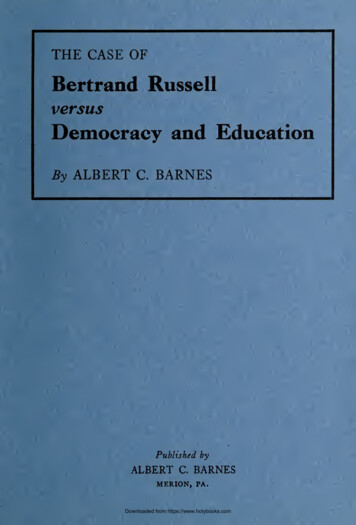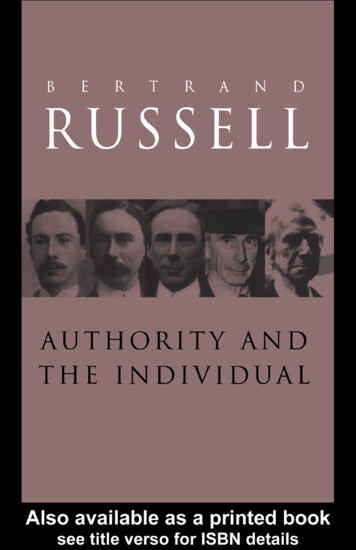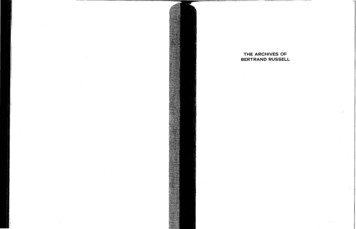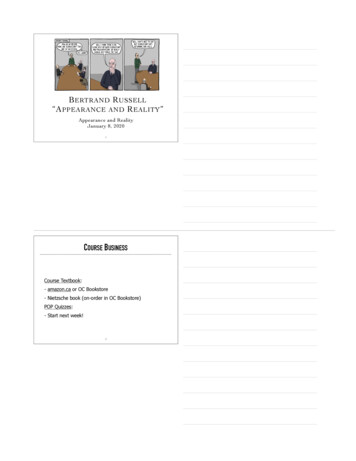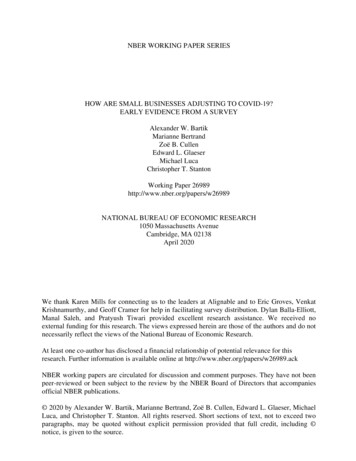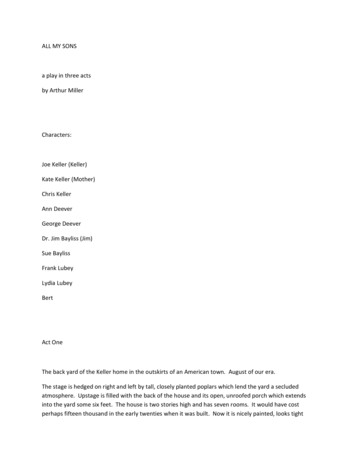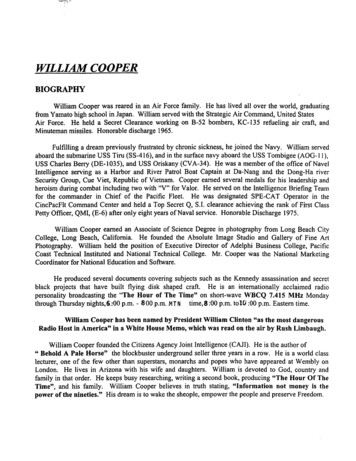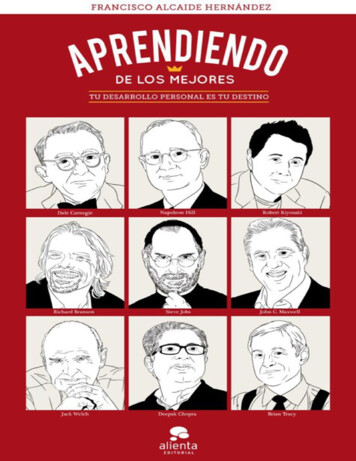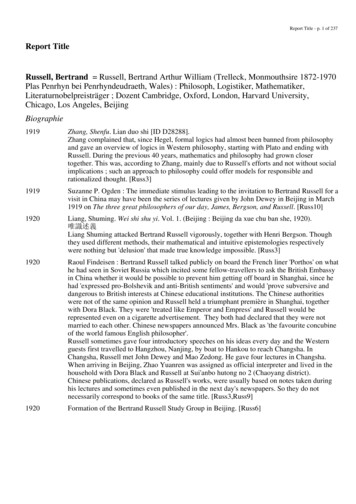
Transcription
Report Title - p. 1 of 237Report TitleRussell, Bertrand Russell, Bertrand Arthur William (Trelleck, Monmouthsire 1872-1970Plas Penrhyn bei Penrhyndeudraeth, Wales) : Philosoph, Logistiker, Mathematiker,Literaturnobelpreisträger ; Dozent Cambridge, Oxford, London, Harvard University,Chicago, Los Angeles, BeijingBiographie1919Zhang, Shenfu. Lian duo shi [ID D28288].Zhang complained that, since Hegel, formal logics had almost been banned from philosophyand gave an overview of logics in Western philosophy, starting with Plato and ending withRussell. During the previous 40 years, mathematics and philosophy had grown closertogether. This was, according to Zhang, mainly due to Russell's efforts and not without socialimplications ; such an approach to philosophy could offer models for responsible andrationalized thought. [Russ3]1919Suzanne P. Ogden : The immediate stimulus leading to the invitation to Bertrand Russell for avisit in China may have been the series of lectures given by John Dewey in Beijing in March1919 on The three great philosophers of our day, James, Bergson, and Russell. [Russ10]1920Liang, Shuming. Wei shi shu yi. Vol. 1. (Beijing : Beijing da xue chu ban she, 1920). Liang Shuming attacked Bertrand Russell vigorously, together with Henri Bergson. Thoughthey used different methods, their mathematical and intuitive epistemologies respectivelywere nothing but 'delusion' that made true knowledge impossible. [Russ3]1920Raoul Findeisen : Bertrand Russell talked publicly on board the French liner 'Porthos' on whathe had seen in Soviet Russia which incited some fellow-travellers to ask the British Embassyin China whether it would be possible to prevent him getting off board in Shanghai, since hehad 'expressed pro-Bolshevik and anti-British sentiments' and would 'prove subversive anddangerous to British interests at Chinese educational institutions. The Chinese authoritieswere not of the same opinion and Russell held a triumphant première in Shanghai, togetherwith Dora Black. They were 'treated like Emperor and Empress' and Russell would berepresented even on a cigarette advertisement. They both had declared that they were notmarried to each other. Chinese newspapers announced Mrs. Black as 'the favourite concubineof the world famous English philosopher'.Russell sometimes gave four introductory speeches on his ideas every day and the Westernguests first travelled to Hangzhou, Nanjing, by boat to Hankou to reach Changsha. InChangsha, Russell met John Dewey and Mao Zedong. He gave four lectures in Changsha.When arriving in Beijing, Zhao Yuanren was assigned as official interpreter and lived in thehousehold with Dora Black and Russell at Sui'anbo hutong no 2 (Chaoyang district).Chinese publications, declared as Russell's works, were usually based on notes taken duringhis lectures and sometimes even published in the next day's newspapers. So they do notnecessarily correspond to books of the same title. [Russ3,Russ9]1920Formation of the Bertrand Russell Study Group in Beijing. [Russ6]
Report Title - p. 2 of 2371920-1921Chao, Yuen Ren [Zhao, Yuanren]. With Bertrand Russell in China [ID D28127].Since there is much more to Bertrand Russell in China than can be covered in this briefarticle, I have prefixed the title with "with" to make it clear that it was my part as Russell'sinterpreter that I am going to write about. Russell arrived in China less than a month after Ireturned toChina after studying in America for ten years. I had been called back to teach mathematicsand physics at Tsing Hua College in Peking. But on August 19, 1920, the third day of myarrival in Shanghai, I was asked by the newly formed Lecture Society to be Russell'sinterpreter. This society was formed by the Progressive Party, led by men like Liang Ch'iCh'ao, Chiang Po Li, Fu T'ung, et al. My friends the Hu brothers, Hu Tun-Fu and HuMing-Fu, and (unrelated) Suh Hu (later better known as Hu Shih) warned me not to be misledby people who invited Russell here just to enhance the political prestige of their politicalparty. When Chin Pang-Cheng (better known as P.C. King), President of Tsing Hua College,was approached about borrowing me to interpret for Russell, he agreed, provided that I didnot leave the Peking locality. As a matter of fact, the Lecture Society was organized right inPeking and before I had taught a full month at Tsing Hua, I was on my way to Shanghai tomeet Bertrand Russell arriving on October 13. This was what I wrote in my diary for thatdate:"Bertrand Russell looked very much what I had expected from photographs and descriptions,except that he looked stronger, taller, and more gracious-mannered than I had thought. Helooked like a scholar. It was easy for me to get acquainted with him thru mutualacquaintances at Harvard."Before going to Peking both Russell and Miss Dora Black gave lectures in Shanghai,Hangchow, Nanking, and Changsha. I usually interpreted for them in Standard Mandarin.But, having always been interested in the Chinese dialects, I tried the Hangchow dialect inHangchow and the Hunan dialect in Changsha, the capital of the province. After one of thelectures at Changsha, a member of the audience came up and asked me, "Sir, which county ofthe province are you from?" He had not realized that I was a speaker of Mandarin imitatingHunanese imperfectly and assumed instead that I was a Hunanese speaking Mandarinimperfectly. On the same trip I had to interpret a speech by Governor T'an Yen-k'ai intoEnglish and somebody else interpreted Russell's. It happened that there was a total eclipse ofthe moon that night, to which Russell referred in his usual witty manner. But the interpreterleft out that best part of his speech and repeated only the usual after-dinner polite words.It was quite a job getting settled in Peking. Having found a house at No. 2 Sui-An Po Hutungin the eastern part of the city, we had to find an English-speaking servant-cook, as I was in noway obliged or qualified to do that sort of interpreting. Mr. Russell and Miss Black used themain northern part of the courtyard and I moved out from Tsing Hua College to join them inthe eastern and western apartments. People very easily got used to the idea that Mr. Russelland Miss Black lived in the same apartment, although it was a revolutionary idea of recentorigin that a boy and a girl should meet each other at all before they got married. As a matterof fact, I myself was very much concerned with the problem of breaking an engagement witha girl I had never met and was much occupied after my return from America to settle thematter, especially as I began to know and was attracted to a Miss Buwei Yang, who wasrunning a hospital in Peking. This made it all the more attractive to move from the Tsing Huasuburb into the city.On November 5, 1920, I interpreted an interview with Russell by Liang Ch'i-Ch'ao. This wasmy first meeting with Liang, whose writings had had a great influence on the young men ofour generation. November 7 was the date of Russell's first regular lecture. It was on problemsof philosophy, held on the Third Campus of the National Peking University. There was anaudience of some 1500 people. I find in my diary I noted that "there is more pleasure to speakas interpreter than as the original speaker, because the former gets the response from theaudience."Other topics Russell lectured on included analysis of mind, idealism, causality, theory ofrelativity, gravitation, and symbolic logic. As a matter of fact, one reason for getting me tointerpret for Russell was my dissertation had been on problems related to logic. The locality
Report Title - p. 3 of 237of the lectures alternated between the National University of Peking and the Teachers'College, which had a very large auditorium. Once I spent too much time with my girl friendDr. Yang and arrived almost ten minutes late, while Russell stood helplessly on the podium.Seeing that I had come in with a girl, he whispered to me, "Bad man, bad man !"I also interpreted Dora Black's lectures. Although the topics were mostly socio-politicallyoriented, which was outside my line, I found them faily easy to translate. Once, before a largeaudience at the Women's Normal School, Miss Black mentioned something about unmarriedmen and unmarried women. There being different words in Chinese for "marry" for men andfor women, I happened to use the wrong verbs and it came out something like "men who haveno husbands and women who have no wives", at which the audience roared with laughter, ofcourse. When the speaker wondered why they were so hilarious, I had to whisper to her, "I'llhave to explain it to you later, it'll take too long now."Besides the regular lectures there were organized small seminars and study groups forRussell's philosophy and a Russell Monthly was published under the editorship of Ch'uShih-Ying. 1 I myself had of course to attend and join these activities. Add to this myactivities in getting disengaged from the girl I didn't know, so that I could get married to thegirl I did learn to know and love, plus translating Alice's Adventures in Wonderland andmaking National Language Records, it was a wonder that I had nothing more than frequentcolds from overwork and overexposure during those chilly northern months. Now Russellfared much less well then I did. With all his radicalism in thought, he was a perfect Englishgentleman in manners down to the last detail in dress, a habit which almost cost him his life.On March 14, I went with him to Paoting, about 100 miles south of Peking, where he lecturedat the Yu Te ("cultivate virtue") Middle school on the subject of education. It was still wintryand windy and he lectured as usual without an overcoat while I shivered beside him even withmy overcoat on. Three days after his return to Peking, he ran a high fever and was attended byDr. Dipper of the German Hospital in the Legation Quarters. After being brought into theHospital, he became worse. March 26 was a black day for me. First, there was news from Dr.Yang, saying that her colleague Dr. Yu had died of the plague on a trip to Manchuria tosurvey the epidemic there. Then I got word that my maternal grandmother had had a stroke inSoochow, of which she died a few days later. That evening I was called to the hospital. Ireported in my diary for that evening:"Prof. Dewey made out form for Mr. Rus. to sign. He was weak but seemed quite clear whathe was doing. He could mutter "power of attorney?" [to Dora Black, that is], then tried tosign. The doctor was afraid "er kann nicht." But he did scribble out B. Russell. He couldrecognize me and called me in, whispered "Mister Ch'." He called Dewey by name and said "Ihope all my friends will stick by me." I stayed for a while talking with Mr. Brandauer of theoxygen adminstrator."The next day Dr. Esser said that Mr. Russell was "more worse". But by March 29 Miss Blackreported that Russell was better. From then on he improved steadily until he was dischargedfrom the hospital and returned to the house. Meanwhile a garbled Japanese report said that'Russell had died. When the report reached Russell himself, he said, "Tell them the news ofmy death was very much exaggerated." During the weeks of Russell's convalescence, I wasbusy finishing my translation of Alice in wonderland, meeting with members of theCommittee on Unification of the National Committee, and, what was of greater personalconcern, going to Shanghai to conclude the business of breaking my engagement with the girlI had never met and then to marry the girl I did know and love. On June I, 1921, with myfriend Hu Shih and Buwei Yang's friend Miss Chu Cheng to sign as witnesses, we weremarried just by moving to a house on Hsiao Yapao Hutung. When we asked Russell whetherour no-ceremony wedding ceremony was too conservative, he replied, "That was radicalenough." July 6 was the last day Russell and Black gave lectures, followed the next day by afarewell party given by Liang Ch'i-Ch'ao, at which Ting Wen-Chiang (better known as V.K.Ting) made a very good send-off speech.On July 11 we saw John Dewey off in the morning and saw Mr. Russel I and Miss Black offin the afternoon. So this is the end of my story of the year with Bertrand Russell in China.After that my wife and I had the opportunity of seeing him once every few years. In 1924 we
Report Title - p. 4 of 237saw him at Land's End in Penzance (where Gilbert and Sullivan's Pirates came from and hadaccess to what he called the Inaccessible Beach. In 1939 we saw him briefly at the ClaremontHotel in Berkeley, California. He said that by the time China wins, the sacrifice in having tobecome more and more totalitarian would not be worth the victory. He ordered, with greatdisapproval, such strange drink as 7-up for our children. In 1941 Professor Ernest Hocking ofHarvard invited me to his departmental lunch, at which Mr. Russell reported on placementsurveys, an unusual topic for him to discuss. In 1954 we visited with him in his London homein Richmond and had the pleasure of meeting Edith Russell for the first time. Finally, in 1968,we took a taxi from London to Plas Penrhyn, Penrhyndeudraeth, Merioneth, on the west coastof Wales and had tea with the Russells. On this occasion I thanked him for the gift of a pun.For one of his few popular lectures in Peking had been on "Causes of the Present Chaos inChina." When after his return to England I informed him of the birth of our first child, Rulan,he said in reply, "Congratulations I see that you are among the causes of the present Chaos inChina." But in his Autobiography he attributed that pun to me. The last view of him was whenhe and Lady Russell stood at the door, Chinese fashion, and waved to us as we were leaving,until we were out of sight. After his decease we received two letters from two Lady Russells,Dora and Edith, on the same day. [Russ5]
Report Title - p. 5 of 2371920-1921Russell, Bertrand. Autobiography [ID D28131]. [Text über Japan wurde ausgelassen. Briefe,die mit China zu tun haben sind chronologisch eingetragen].We travelled to China from Marseilles in a French boat called 'Portos'. Just before we leftLondon, we learned that, owing to a case of plague on board, the sailing would be delayed forthree weeks. We did not feel, however, that we could go through all the business of sayinggoodbye a second time, so we went to Paris and spent three weeks there. During this time Ifinished my book on Russia, and decided, after much hesitation, that I would publish it. Tosay anything against Bolshevism was, of course, to play into the hands of reaction, and mostof my friends took the view that one ought not to say what one thought about Russia unlesswhat one thought was favourable. I had, however, been impervious to similar arguments frompatriots during the War, and it seemed to me that in the long run no good purpose would beserved by holding one's tongue. The matter was, of course, much complicated for me by thequestion of my personal relations with Dora. One hot summer night, after she had gone tosleep, I got up and sat on the balcony of our room and contemplated the stars. I tried to see thequestion without the heat of party passion and imagined myself holding a conversation withCassiopeia. It seemed to me that I should be more in harmony with the stars if I publishedwhat I thought about Bolshevism than if I did not. So I went on with the work and finished thebook on the night before we started for Marseilles.The bulk of our time in Paris, however, was spent in a more frivolous manner, buying frockssuitable for the Red Sea, and the rest of the trousseau required for unofficial marriage. After afew days in Paris, all the appearance of estrangement which had existed between us ceased,and we became gay and light-hearted. There were, however, moments on the boat whenthings were difficult. I was sensitive because of the contempt that Dora had poured on myhead for not liking Russia. I suggested to her that we had made a mistake in coming awaytogether, and that the best way out would be to jump into the sea. This mood, however, whichwas largely induced by the heat, soon passed.The voyage lasted five or six weeks, to that one got to know one's fellow-passengers prettywell. The French people mostly belonged to the official classes. They were much superior tothe English, who were rubber planters and business men. There were rows between theEnglish and the French, in which we had to act as mediators. On one condition the Englishasked me to give an address about Soviet Russia. In view of the sort of people that they were,I said only favourable things about the Soviet Government, so there was nearly a riot, andwhen we reached Shanghai our English fellow-passengers sent a telegram to the ConsulateGeneral in Peking, urging that we should not be allowed to land. We consoled ourselves withthe thought of what had befallen the ring-leader among our enemies at Saigon. There was atSaigon an elephant whose keeper sold bananas which the visitors gave to the elephant. Weeach gave him a banana, and he made us a very elegant bow, but our enemy refused,whereupon the elephant squirted dirty water all over his immaculate clothes, which also thekeeper had taught him to do. Perhaps our amusement at this incident did not increase his loveof us.When we arrived at Shanghai there was at first no one to meet us. I had had from the first adark suspicion that the invitation might be a practical joke, and in order to test its genuinenessI had got the Chinese to pay my passage money before I started. I thought that few peoplewould spend 125 on a joke, but when nobody appeared at Shanghai our fears revived, andwe began to think we might have to creep home with our tails between our legs. It turned out,however, that our friends had only made a little mistake as to the time of the boat's arrival.They soon appeared on board and took us to a Chinese hotel, where we passed three of themost bewildering days that I have ever experienced. There was at first some difficulty inexplaining about Dora. They got the impression that she was my wife, and when we said thatthis was not the case, they were afraid that I should be annoyed about their previousmisconception. I told them that I wished her treated as my wife, and they published astatement to that effect in the Chinese papers. From the firs moment to the last of our stay inChina, every Chinese with whom we came in contact treated her with the most complete andperfect courtesy, and with exactly the same deference as would have been paid to her if shehad been in fact my wife. There did this in spite of the fact that we insisted upon her always
Report Title - p. 6 of 237being called 'Miss Black'.Our time in Shanghai was spent in seeing endless people, Europeans, Americans, Japanese,and Koreans, as well as Chinese. In general the various people who came to see us were noton speaking terms with each other ; for instance, there could be no social relations betweenthe Japanese and the Korean Christians who had been exiled for bomb-throwing. (In Korea atthat a time a Christian was practically synonymous with a bomb-thrower.) So we had to putour guests at separate tables in the public room, and move round from table to tablethroughout the day. We had also to attend an enormous banquet, at which various Chinesemade after-dinner speeches in the best English style, with exactly the type of joke which isdemanded of such an occasion. It was our first experience of the Chinese, and we weresomewhat surprised by their wit and fluency. I had not realized until then that a civilizedChinese is the most civilized person in the world. Sun Yat-sen invited me to dinner, but to mylasting regret the evening he suggested was after my departure, and I had to refuse. Shortlyafter this he went to Canton to inaugurate the nationalist movement which afterwardsconquered the whole country, and as I was unable to go to Canton, I never met him.Our Chinese friends took us for two days to Hangchow to see the Western Lane. The first daywe went round it by boat, and the second day in chairs. It was marvelously beautiful, with thebeauty of ancient civilization, surpassing even that of Italy. From there we went to Hanking,and from Nankin by boat to Hankow. The days on the Yangtse were as delightful as the dayson the Volga had been horrible. From Hankow we went to Changsha, where an educationalconference was in progress. They wished us to stay there for a week, and give addresses everyday, but we were both exhausted and anxious for a chance to rest, which made us eager toreach Peking. So we refused to stay more than twenty-four hours, in spite of the fact that theGovernor of Hunan in person held out every imaginable inducement, including a special trainin all the way to Wuchang.However, in order to do my best to conciliate the people of Changsha, I gave four lectures,two after-dinner speeches, and an after-lunch speech, during the twenty-four hours. Changshawas a place without modern hotels, and the missionaries very kindly offered to put us up, butthey made it clear that Dora was to stay with one set of missionaries, and I with another. Wetherefore thought it best to decline their invitation, and stayed at a Chinese hotel. Theexperience was not altogether pleasant. Armies of bugs walked across the bed all through thenight.The Tuchun (the military Governor of the Province) gave a magnificent banquet, at which wefirst met the Deweys, who behaved with great kindness, and later, when I became ill, JohnDewey treated us both with singular helpfulness. I was told that when he came to see me inthe hospital, he was much touched by my saying, 'We must make a plan for peace' at a timewhen everything else that I said was delirium. We assembled in one vast hall and then movedinto another for the feast, which was sumptuous beyond belief. In the middle of it the Tuchunapologized for the extreme simplicity of the fare, saying that he thought we should like to seehow they lived in everyday life rather than to be treated with any pomp. To my intensechagrin, I was unable to think of a retort in kind, but I hope the interpreter made up for mylack of wit. We left Changsha in the middle of a lunar eclipse, and saw bonfire being lit andheard gongs beaten to frighten off the Heavenly Dog, according to the traditional ritual ofChina on such occasions. From Changsha, we travelled straight through to Peking, where weenjoyed our first wash for ten days.Our first months in Peking were a time of absolute and complete happiness. All thedifficulties and disagreements that we had were completely forgotten. Our Chinese friendswere delightful. The work was interesting, and Peking itself inconceivably beautiful.We had a house boy, a male cook and a rickshaw boy. The house boy spoke some English andit was through him that we made ourselves intelligible to the others. This process succeededbetter than it would have done in England. We engaged the cook sometime before we came tolive in our house and told him that the first meal we should want would be dinner some dayshence. Sure enough, when the time came, dinner was ready. The house boy knew everything.One day we were in need of change and we had hidden what we believed to be a dollar in anold table. We described its whereabouts to the house boy and asked him to fetch it. He replied
Report Title - p. 7 of 237imperturbably, 'No, Madam. He bad'. We also had the occasional services of a sewingwoman. We engaged her in the winter and dispensed with her services in the summer. Wewere amused to observe that while, in winter, she had been very fat, as the weather grewwarm, she became gradually very thin, having replaced the thick garments of winter graduallyby the elegant garments of summer. We had to furnish our house which we did from the veryexcellent second-hand furniture shops which abounded in Peking. Our Chinese friends couldnot understand our preferring old Chinese things to modern furniture from Birmingham. Wehad an official interpreter assigned to look after us. His English was very good and he wasespecially proud of his ability to make puns in English. His name was Mr Chao and, when Ishowed him an article that I had written called 'Causes of the Present Chaos', he remarked,'Well, I suppose, the causes of the present Chaos are the previous Chaos'. I became a closefriend of his in the course of our journeys. He was engaged to a Chinese girl and I was able toremove some difficulties that had impeded his marriage. I still hear from him occasionallyand once or twice he and his wife come to see me in England.I was very busy lecturing, and I also had a seminar of the more advanced students. All ofthem were Bolsheviks except one, who was the nephew of the Emperor. They used to slip offto Moscow one by one. They were charming youths, ingenuous and intelligent at the sametime, eager to know the works and to escape from the trammels of Chinese tradition. Most ofthem had been betrothed in infancy to old-fashioned girls, and were troubled by the ethicalquestion whether they would be justified in breaking the betrothal to marry some girl ofmodern education. The gulf between the old China and the new as vast, and family bondswere extraordinarily irksome for the modern-minded young man. Dora used to go to the Girls'Normal School, where those who were to be teachers were being trained. They would put toher every kind of question about marriage, free love, contraception, etc., and she answered alltheir questions with complete frankness. Nothing of the sort would have been possible in anysimilar European institution. In spite of their freedom of thought, traditional habits ofbehavior had a great hold upon them. We occasionally gave parties to the young men of myseminar and the girls at the Normal School. The girls at first would take refuge in a room towhich they supposed no men would penetrate, and they had to be fetched out and encouragedto associate with males. It must be said that when once the ice was broken, no furtherencouragement was needed.The National University of Peking for which I lectured was a very remarkable institution. TheChancellor and the Vice-Chancellor were men passionately devoted to the modernising ofChina. The Vice-Chancellor was one of the most whole-hearted idealists that I have everknown. The funds which should have gone to pay salaries were always being appropriated byTuchums, so that the teaching was mainly a labour of love. The students deserved what theirprofessors had to give them. They were ardently desirous of knowledge, and there was nolimit to the sacrifices that they were prepared to make for their country. The atmosphere waselectric with the hope of a great awakening. After centuries of slumber, China was becomingaware of the modern world, and at that time the sordidnesses and compromises that go withgovernmental responsibility had not yet descended upon the reformers. The English sneeredat the reformers, and said that China would always be China. They assured me that it was sillyto listen to the frothy talk of half-baked young men ; yet within a few years those half-bakedyoung men had conquered China and deprived the English of many of their most cherishedprivileges.Since the advent of the Communists to power in China, the policy of the British towards thatcountry has been somewhat more enlightened than that of the United States, but until thattime the exact opposite was the case. In 1926, on three separate occasions, British troops firedon unarmed crowds of Chinese students, killing and wounding many. I wrote a fiercedenunciation of these outrages, which was published first in England and then throughoutChina. An American missionary in China, with whom I corresponded, came to Engliandshortly after this time, and told me that indignation in China had been such as to endanger thelives of all Englishmen living in that country. He even said – though I found this scarcelycredible – that the English in China owed their preservation to me, since I had causedinfuriated Chinese to include that not all Englishmen are vile. However that may be, I
Report Title - p. 8 of 237incurred the hostility, not only of the English in China, but of the British Government.White men in China were ignorant of many things that were common knowledge among theChinese. On one occasion my bank (which was American) gave me notes issued by a Frenchbank, and I found that Chinese tradesmen refused to accept them. My bank expressedastonishment, and gave me other notes instead. Three months later, the French bank wentbankrupt, to the surprise of all other white banks in China.The Englishman in the East, as far as I was able to judge of him, is a man completely out oftouch with his environment. He plays polo and goes to his club. He derives his ideas of nativeculture from the works of eighteenth-century missionaries, and he regards intelligence in theEast with the same contempt which he feels for intelligence in his own country. Unfortunatelyfor our political sagacity, he overlooks the fact that in the East intelligence is respected, sothat enlightened Radicals have an influence upon affairs which is denied to their Englishcounterparts. MacDonald went to Windsor in knee-breeches, but the Chinese reformersshowed no such respect to their Emperor, although our monarchy is a mushroom growth ofyesterday compared to that of China.My views as to what should be done in China I put into my book The problem of China andso shall not repeat them here.In spite of the fact that China was in a ferment, it appeared to us, as compared with Europe, tobe a country filled with philosophic calm. Once a week the mail would arrive from England,and the letters and newspapers that came from there seemed to breathe upon us a hot blast ofinsanity like the fiery heat that comes from a furnace door suddenly opened. As we had towork on Sundays, we made a practice of taking a holiday on
Chinese publications, declared as Russell's works, were usually based on notes taken during his lectures and sometimes even published in the next day's newspapers. So they do not necessarily correspond to books of the same title. [Russ3,Russ9] 1920 Formation of the Bertrand Russell S
